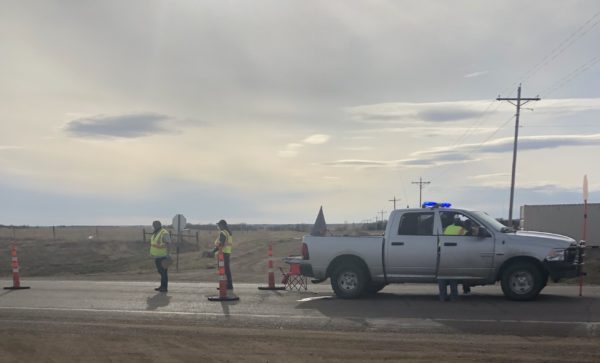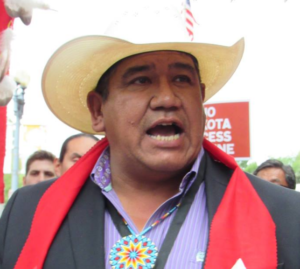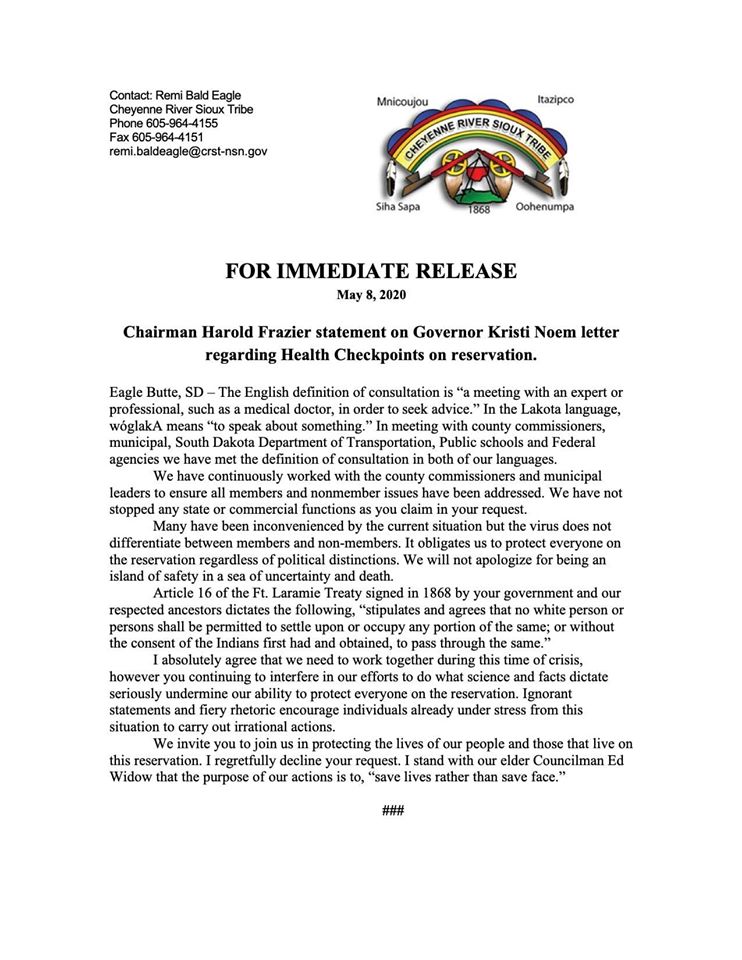
- Details
- By Levi Rickert
PIERRE, S.D. — The leaders of the Cheyenne River Sioux Tribe and Oglala Sioux Tribe received letters from South Dakota Governor Kristi Noem on Friday telling them they need to remove the checkpoints onto their respective Indian reservations.
Noem’s letters were sent to Cheyenne River Sioux Tribe Chairman Harold Frazier and Oglala Sioux Tribe President Julian Bear Runner.
 South Dakota Gov. Kristi Neom
South Dakota Gov. Kristi Neom
While the letters were written as requests to tribes to remove the checkpoints, Gov. Noem gave each tribe 48 hours to remove the checkpoints or face legal action.
On Friday afternoon, both tribes said they would not take down the checkpoints that were installed to keep outsiders out and insiders in the reservation to curtail the spread of the deadly coronavirus.
Oglala Sioux Tribe’s spokesperson Chase Iron Eyes told Native News Online on Friday afternoon that the tribe has no intention to remove the 10 checkpoints at the Pine Ridge Indian Reservation and welcomes an opportunity to sit down with the governor to discuss the matter.
“We are not going to let her treat us like domestic dependents. We make our own laws for our tribal nation,” Iron Eyes said. “Why would we allow the illegal aliens to bring disease onto our homelands.”
Iron Eyes said he feels the Gov. Noem has mishandled the COVID-19 pandemic and has not taken strong enough action.
“She has relied on South Dakotans to exercise common sense and resiliency to fight the virus. Our tribal nation has been stronger with our lockdowns,” Iron Eyes said.
Cheyenne River Sioux Tribe’s Chairman Frazier says his tribe has worked with county commissioners and other officials.
“Many have been inconvenienced by the current situation, but the virus does not differentiate between (tribal) members and non-members. It obligates us to protect everyone on the reservation regardless of political distinctions. We will not apologize for being an island of safety in a sea of uncertainty and death,” Chairman Frazier said in a statement released Friday afternoon. “I stand with our elder Councilman Ed Widow that the purpose of our actions is to ‘save lives rather than save face.’”
In his statement, Chairman Frazier cites the 1868 Ft. Laramie Treaty that says “no white person or persons shall be permitted to settle upon or occupy any portion of the same; or without the consent of the Indians first had and obtained, to pass through the same.”
 Cheyenne River Sioux Tribe Chairman Harold Frazier. Native News Online photograph by Levi Rickert
Cheyenne River Sioux Tribe Chairman Harold Frazier. Native News Online photograph by Levi Rickert
One Democratic South Dakota state senator, who is a Lakota and Navajo, weighed in on the showdown between the governor and tribes.
“Treaties are the supreme law of the land and must be enforced, even though the state roads go through sovereign tribal nations, they change jurisdiction. Tribes, as sovereign nations, are responsible for protecting our people,” said State Senator Red Dawn Foster, whose senate district covers the Pine Ridge Indian Reservation.
“They have taken into consideration the high number of vulnerable populations with underlying health issues, our healthcare facilities’ capacity, remote location and distance our citizens have to travel for access to healthcare and have determined checkpoints are necessary components to keeping our people safe.”
 CORRECTION: An earlier version of this story contained an editing error. The spokesperson for the Oglala Sioux Tribes is Chase Iron Eyes, not Clare Iron Eyes.
CORRECTION: An earlier version of this story contained an editing error. The spokesperson for the Oglala Sioux Tribes is Chase Iron Eyes, not Clare Iron Eyes.
More Stories Like This
Native News Weekly (August 25, 2024): D.C. BriefsTwo Native Americans Named to Democratic Congressional Campaign Committee's“Red to Blue” Program
Cheyenne River Youth Project Hosts Young Women’s Winter Camp as Part of Lakota Culture Internship
Showing Up When It Matters: Flanagan’s Response to Minnesota’s Immigration Crisis
Monday Morning: (February 23, 2026): Articles You May Have Missed This Past Weekend
Help us defend tribal sovereignty.
At Native News Online, our mission is rooted in telling the stories that strengthen sovereignty and uplift Indigenous voices — not just at year’s end, but every single day.
Because of your generosity last year, we were able to keep our reporters on the ground in tribal communities, at national gatherings and in the halls of Congress — covering the issues that matter most to Indian Country: sovereignty, culture, education, health and economic opportunity.
That support sustained us through a tough year in 2025. Now, as we look to the year ahead, we need your help right now to ensure warrior journalism remains strong — reporting that defends tribal sovereignty, amplifies Native truth, and holds power accountable.
 The stakes couldn't be higher. Your support keeps Native voices heard, Native stories told and Native sovereignty defended.
The stakes couldn't be higher. Your support keeps Native voices heard, Native stories told and Native sovereignty defended.
Stand with Warrior Journalism today.
Levi Rickert (Potawatomi), Editor & Publisher

